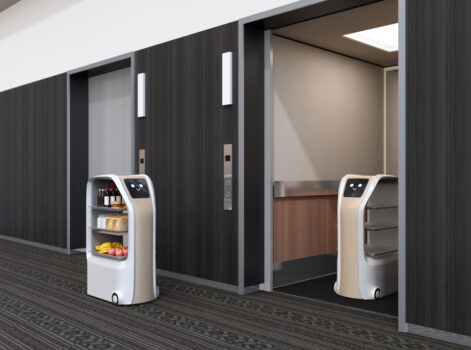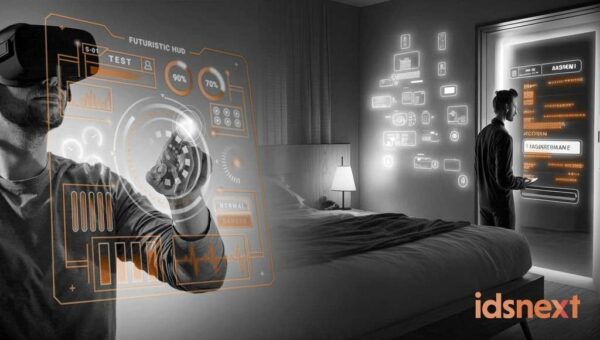The hotel industry has had some extraordinary changes in 2022 while recovering from the financial wreck of the 2020-2021 lockdowns. As we move forward, travelers are becoming more ready and willing to explore in the new year. Thus, global reliance on technology for services, communication, and bookings shot up exponentially.
Hoteliers need to be aware of where the industry is heading with the travel world undergoing a massive digital transformation. The future is bright for hoteliers who deploy cutting-edge technologies, prioritize sustainability, tap into local markets, and automate their operations.
Hence, hoteliers should be on the lookout for key hotel trends that’ll shape the industry in 2023.
1. automation tops 2023 hotel trends
Convenience and efficiency are parallels that only technology can provide. Automation and technology are becoming increasingly popular in the hotel industry, from facial recognition software to self-check-in kiosks.
Smart hotels are replacing manual processes with automated solutions, such as:
- Automatic check-ins/check-outs
- Robots for room service and housekeeping
- AI-powered chatbots for customer support
- Smart thermostats for energy management
Data is central to the operations of a hotel, and automation is key to collecting, analyzing, and leveraging this data. Hotels can efficiently manage their resources while providing a seamless user experience by utilizing automated software solutions.
For example, The Westin Houston Hotel took up robot room sterilization to combat the spread of Covid19 in 2020, as the bots automated the process of sanitizing rooms, with ultraviolet light disinfecting the entire area in just 10 minutes. The Westin Houston Hotel benefited by saving time, money, and providing a safe environment to its customers.
Smart systems have also advanced. Now, guests can control the lighting, heating, and air conditioning in their rooms from a smartphone or tablet. Automation enables hotels to save energy and provides a more comfortable stay for its guests.

Automation also helps in the repetitive quality assurance tasks of products and services, which is essential for customer satisfaction. Hoteliers handle a lot, and automation helps when you integrate it with Point of Sale (POS) tools and Compliance Management Software (CMS).
For example, the Intercontinental Hotels Group, a giant in American hospitality, grew with the effectiveness of adopting the MICROS 9700 and 3700 point-of-sale (POS) systems in 2008. Others are still playing catch-up to date.
2. Augmented and Virtual Reality
Virtual and augmented reality are cutting-edge technologies that are being adopted by the hotel industry in many ways.
Augmented and virtual reality provides guests with virtual tours of room amenities, local visual attractions, and restaurant reservations. For example, guests can virtually tour the property before committing to stay at the AR hotel unveiled by Holiday Inn.
Holiday Inn is arguably the first hotel to use augmented reality (AR) in their lobby. This hoteling brand curated a lobby full of virtual depictions of famous celebrities, providing novel and fun interactive experiences for their guests.
InSpace is a virtual conferencing platform that provides hotels with a range of interactive virtual experiences for their guests. Hotels are able to create immersive and engaging experiences within their own environment including virtual tours, games, quizzes and more.
In 2014, Premier Inn got into the augmented reality game by offering interactive maps to their guests. Guests just point their smartphone at the map to get information about points of attraction near their hotel.

Touring a hotel’s facilities virtually in a 360-degree view has become one of the most popular ways hotels are using virtual reality (VR). The Hôtel des Arts Saigon launch included a VR tour of their hotel, giving potential guests a glimpse into what they could experience at the hotel.
In the eyes of travelers, it eases the pain of deciding to book. It also eliminates the anxiety of not being able to physically inspect the rooms before booking.
3. Sustainability
Sustainability is, and will continue to be, one of the key hotel trends in 2023. Travelers today are more prone to investigate hotels’ environmental policies before deciding to book. Hotels can now go green with technology and automation to minimize their environmental impact while at the same time boosting customer satisfaction.
In July 2022, Bookings.com did a survey and found that 83% of travelers prioritize sustainability in their hotel stays. Thus, hoteliers should also consider offering guests an eco-friendly experience with sustainable accommodation, green transport options, and recyclable amenities.
For example, corporate employees travel on the expense accounts of their companies, and such travelers are willing to pay more for sustainable hotel stays.
The United States Environmental Protection Agency (EPA) regulates hotels for compliance and conservationist efforts. The intention of this regulation is to reduce energy consumption, water consumption, and greenhouse gas emissions.
EPA’s global influence is expected to positively affect the hotel industry. With hotels now having to consider their operational carbon footprint, hoteliers should also:
- Look to deploy technologies that help reduce their energy consumption
- Incorporate alternative energy sources
- Dispose of wastes in an environmentally sound manner
The EPA suggests hotels use motion sensors that detect people in a room and turn off the lights when no one is there. Hotels can also install smart thermostats that adjust the temperature according to occupancy levels.
4. Localization
In 2020-2021, the pandemic made it extremely difficult for international travel to continue as before. Looking inwards to their roots and cultures, travelers who still wanted to travel turned to domestic locales.
Hoteliers should look to tap into this trend and harness local resources. By creating experiences that allow travelers to explore offbeat locations, uncover hidden gems and engage with locals, hoteliers can differentiate their offerings from the competition.
Hotel direct booking will increase for hotels that localize their themes to appeal to travelers. Hoteliers can also collaborate with local businesses for food provision and activities and ultimately support the local economy.
For example, Texas has a rich history of local cuisine and culture. Canvas Hotel Dallas offers a banquet hall and gaming rooms that take you back to the Wild West. The St. Anthony in San Antonio offers jazz music to leverage the rich musical history and flamenco dancing.
These examples provide an opportunity to create a localized experience that travelers can’t get anywhere else. Such themes turn local brands into national brands, and hotels can benefit from increased occupancy rates.
5. Bleisure
The gig economy is taking over as the mass resignation of corporate employees from the 9-5 job started rising. A surge of business travelers looking for leisure and value in their stay is expected to continue, with hotels having to offer more varied packages and flexible check-in/check-out policies.
Hoteliers should look to cater to this growing bleisure trend by offering attractive live-work packages to digital nomads, incorporating services such as central co-working spaces and dedicated business rooms.
Thus, installations like fast, secure WiFi connections and conference facilities should be prioritized while incorporating leisure elements like spas, gyms, and themed experiences.
The lowdown on 2023 Hotel Trends
At NewGen Advisory, we believe that 2023 is the year for technology-driven hotel trends. Hoteliers who embrace these emerging technologies and other 2023 hotel trends can benefit from increased occupancy rates and customer satisfaction.
We are committed to helping our clients navigate the ever-evolving hospitality landscape by providing tailored solutions that could meet their specific goals and objectives. Contact us if you’re planning to purchase or sell a hotel and need guidance.


